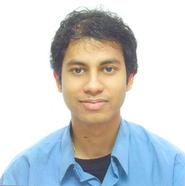
Internships took Hamilton students all over the globe this summer, from rural Vermont to Delhi, India, where Abhishek Maity '08 (Kolkata, India) spent his summer interning with Research and Information Systems for Developing Countries (RIS), a government policy think tank. Maity also had a Levitt Fellowship for the summer to research optimal foreign reserve holdings – a topic which is closely related to his internship.
Maity was one of more than 20 Hamiltonians who received college funding to participate in a summer internship. Work experience is becoming more and more necessary for college students but many opportunities are unpaid and require students to pay their own housing and living expenses as well as working for free.
Thanks to alumni and parent donations, Hamilton students can apply for funding to support them while they work in a field of interest with an organization that cannot pay them. Though Maity works in an unpaid internship, he received a stipend from Hamilton's Joseph F. Anderson Internship Fund, given in honor of a 1944 Hamilton graduate who served the college for 18 years as vice president for communications and development. The fund in his name provides individual stipends to support full-time internships for students wishing to expand their educational horizons in preparation for potential careers after graduation.
Maity's research focused on foreign exchange reserve holdings, or the amount of foreign currency held by a given country. Traditional thought states that "the more foreign reserves the better it is for a country's economy," but new research challenges this relationship. For instance, Maity explained, "instead of holding low yield (sometimes negative return) U.S. treasury bills, a country could invest in the equity market and earn higher returns," and cited the economic success of South Korea and Singapore, both of which have used this strategy. He hopes "to develop a dynamic model to estimate what a developing country's foreign reserves should be" based on a number of factors.
Interviewed in mid-August, Maity announced that his research had taken an unexpected turn. He had hypothesized that there must exist an optimal reserve equilibrium, but he suspected that the optimal reserves could be zero and that an ideal situation is one where there is in fact no foreign exchange reserve.
Maity's internship at RIS dealt with a major assumption in the above problem: that many countries store their foreign reserve holdings in U.S. bills. The depreciation of the U.S. dollar suggests that this may no longer be the best currency to use as a unit of account. RIS, along with the Asian Development Bank, is working on developing a potential Asian Currency Unit (ACU) as an alternative to the U.S. dollar. The ACU will stabilize trade patterns by counterbalancing the volatile exchange rates between trading partners in the Asian region. At RIS, Maity worked on a policy brief for the Ministry of Finance for the Asian Summit on the viability of the ACU and the subsequent Asian Economic Integration.
He enjoyed his work with RIS. "There are a lot of smart people here; celebrities even, in the economic policy field" with whom Maity can discuss his work. As for doing two long-term investigations at once, that was easier than he expected. "The two topics overlap and it gives an insight to different approaches I could attempt in either of them." He also enjoyed living in the busy and entertaining city of Delhi. "I love this city. It has a healthy disregard for normalcy and there could be adventure at every street corner, or cows outside your door in your second floor flat."
During the year, Maity is a grader for the math and economics departments. He works for Information Tech. Services, Student Activities and in the media library, as well as acting as Social and Cultural Chair of the Asian Cultural Society. This year he will be a Hindi tutor and hopes to join the Equestrian Club. A rising senior, Maity has exotic plans for after graduation: he wants to travel the ancient Silk Road on horseback.
Maity's research this summer is funded by the Levitt Research Fellows Program, operated through the Arthur Levitt Public Affairs Center. The students spend the summer working intensively in collaboration with a faculty member on an issue related to public affairs; Maity is collaborating with the James L. Ferguson Professor of Economics Erol Balkan.
-- by Lisbeth Redfield
Posted August 14, 2007
